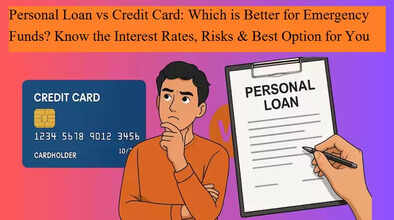Personal Loan vs Credit Card: Which is Better for Emergency Funds? Know the Interest Rates, Risks & Best Option for You

Financial emergencies can strike unexpectedly, leaving you in urgent need of funds. In such situations, two of the most accessible borrowing options are personal loans and credit cards. While both can provide immediate financial relief, choosing the right one depends on your repayment capacity, financial discipline, and specific needs. A wrong decision could land you in a debt trap with high-interest costs. Let’s break down which option works best in which scenario.
Interest Rates: The Key Difference
One of the biggest distinctions between personal loans and credit cards lies in their interest rates. Personal loans generally come with a fixed annual interest rate ranging from 10% to 18%, depending on your credit profile and the lender's policies.
On the other hand, credit cards attract a much higher annual interest rate, often between 36% to 42%, especially if you convert your dues into EMIs or fail to pay the full outstanding amount. Therefore, if you plan to repay over several months, a personal loan proves to be a far more cost-effective option.
Convenience and Risk in Credit Cards
Credit cards offer unmatched convenience for immediate expenses, travel bookings, or online shopping, provided you can repay the full amount within the interest-free grace period (typically 45-50 days). However, paying only the minimum due can lead to rapid accumulation of interest, pushing you into a debt spiral. Hence, disciplined usage and timely payments are crucial when relying on credit cards.
Personal Loan: Ideal for Large Expenses
For significant financial needs such as wedding expenses, medical emergencies, or home renovations, a personal loan is a safer choice. It offers a lump-sum amount upfront and structured repayment through EMIs over 1 to 5 years. This allows better financial planning and budgeting compared to the revolving credit of a card.
Impact on Credit Score
Both personal loans and credit card usage directly impact your credit score. A higher credit score (750+) improves your chances of securing lower interest rates and favorable loan terms. However, missing EMI payments or consistently exceeding your credit card limit can harm your credit profile. It’s advisable to borrow amounts that align with your monthly income and repayment capacity.
Which Option Should You Choose?
While credit cards offer flexibility and immediate access to funds, they also require strict self-control to avoid overspending. On the contrary, personal loans encourage financial discipline through fixed EMIs but offer less flexibility. Therefore, if you need structured repayments and larger amounts, a personal loan is suitable. If you require short-term funds and can repay quickly, a credit card may suffice.
Frequently Asked Questions (FAQs)
Q1: Is a personal loan cheaper than a credit card?
Yes, personal loans generally come with lower interest rates (10-18%) compared to credit cards, which can charge up to 40% annually.
Q2: Can I convert credit card spends into EMIs?
Most credit cards offer EMI conversion for large spends. However, the interest rates are higher than personal loans, and the repayment tenure is usually shorter.
Q3: When should I prefer a personal loan over a credit card?
For large, planned expenses like weddings or home renovations, personal loans are ideal. For smaller, short-term expenses or shopping, credit cards are more convenient if repaid within the interest-free period.
Conclusion:
Choosing between a personal loan and a credit card depends on your urgency, repayment capacity, and financial discipline. Understanding the pros and cons of both can save you from unnecessary financial stress and help you manage your funds wisely during emergencies.

